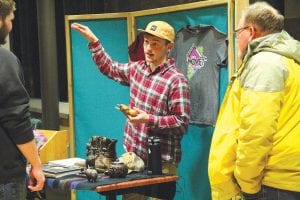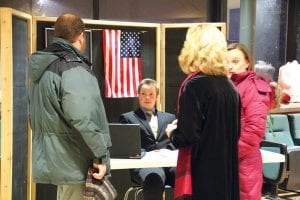With his father looking on, Jack Viren talks about some of the mission trips he has been on and his interaction with people from different cultures. Viren was one of nine Cook County High School students taking part in “Careers and Controversy,” a class taught by high school English teacher Ivy Church.

Whether her career takes her to the inner city or the countryside, Brooke Sherer knows she would like to pursue a career in Native American social work.
“Once I am done with school I don’t know if I will look for a job here, Duluth, the Twin Cities or somewhere else. I just know that there are a lot of people that need help,” said Sherer, who was one of nine Cook County High School seniors who took part in the “Careers and Controversy” college writing class offered through the University of Minnesota Duluth (UMD) and taught locally by Ivy Church.
In a presentation to the community, the seniors gathered at tables with information about their academic pursuits on hand, ready to answer questions the public asked them at the Arrowhead Center for the Arts on a snowy, blustery Monday evening, Jan. 9.
Emily Jacobsen’s topic was “Coaching to Gender Differences.” Jacobsen explained it was her feeling— and research—that led her to conclude it was hard for men to coach women and women to coach men. “If a male coach gets angry at a girl he is coaching in a game it’s been shown that the female will sometimes be alienated by this behavior. When a male coach gets mad at a male player, the male player doesn’t usually have the same type of reaction,” Jacobsen said. When asked if she will pursue a career in coaching, Jacobsen gave it some thought before responding, “Maybe when I am older I will want to coach. But for now, after high school, I want to study business.”

Noah Roth argued that it is okay for the government to sort through your emails and telephone calls because it is the best way to identify who might be a terrorist and a threat to the safety of the nation.
Noah Roth explained what metadata mining was to an interested audience and why it is important for the country’s safety to pursue it. His topic was “Personal Privacy versus National Security.” Roth said he might consider working for the National Security Agency (NSA) someday if he could become good at coding.
What exactly is metadata mining? As Roth told it, “NSA gathers all of the information, your data — from your phones, emails, Google, Facebook – then combs through that data to find patterns in who you call or what information you are seeking. If it is something that interests them, or causes concern, they flag that data and study it. They don’t listen to your phone calls or read your emails. That’s not why they are gathering this information.”
Metadata tagging enables the NSA to use algorithms to identify connections. Initially tagging data is the first step in data mining because it allows analysts to classify and organize the information so it can be searched and processed. Only about 3 percent of all of the data in the digital universe is tagged when it is created. Once the NSA has gathered accurate information about a suspect, it passes it on to the FBI, CIA, or Pentagon who use it to track and find terrorists who threaten our country.
Molly Thomas is a talented artist who wants to become an art director. “When to Refuse a Designing Job” was her topic.
Jack Viren has already been on three missions trips, so it was no surprise that his topic was something in that field. Viren’s theme was called “Acculturation in Mission Work.” In his travels, Viren has learned, “That each culture is different and it takes some time to get used to the people and know best how to work with them.”
Hannah Vander Heiden had Cook County High School Counselor Kris Hoffman at her table. Her topic was “When to Join the Armed Services.” Hoffman is a veteran who served in the National Guard. He said much of his education was paid for by his service in the military. Vander Heiden said she is looking at her options and will decide when is the best time to make a commitment to serve her country.
Three young ladies shared a table and had similar topics. Tarin Hanson’s was “When to Stop Life Support.” Julia Larsen presented “Severe Trauma and Life Support,” and Sarah Toftey answered questions about “Life Support and Assisted Suicide.” All sticky subjects that states are currently working on.
All of the topics, said Church, were in fields of study that the students are considering entering. The students studied codes of ethics for professions that interested them, and then researched ethical dilemmas that they might face in the future, she said. “They took this class seriously. They are well prepared to answer questions put to them. This is somewhat unique because they are presenting to the public. Most kids taking this class somewhere else wouldn’t do that. We thought this would be a great way for the public to see what they are learning.”


Loading Comments